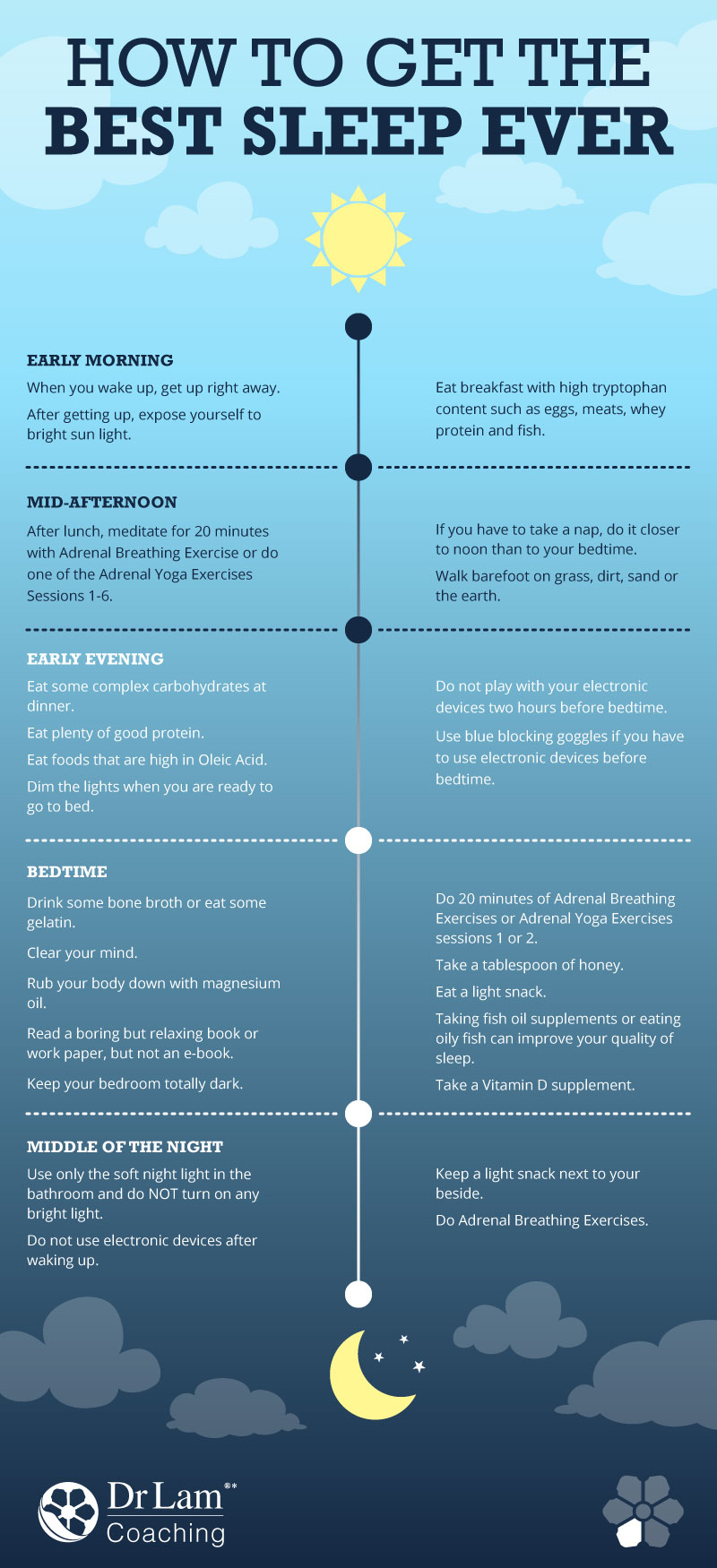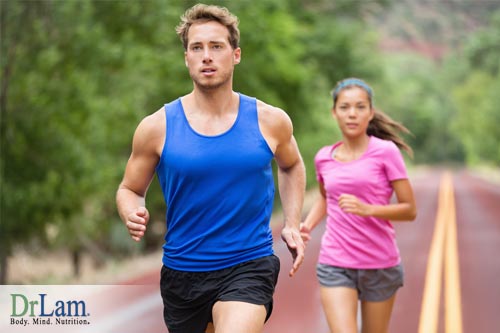 Getting proper sleep is a necessary and important component of any adrenal recovery program. This is easier said than done due to autonomic and metabolic derangements within the body. Here are some tips that we have found helpful in your daily living- how to get the best sleep.
Getting proper sleep is a necessary and important component of any adrenal recovery program. This is easier said than done due to autonomic and metabolic derangements within the body. Here are some tips that we have found helpful in your daily living- how to get the best sleep.
Learning how to get the best sleep begins with the morning routine. There are several important changes an individual can make to their day to increase sleep quality at night.
When you wake up, get up right away. Do not use the snooze button, as this will fragment your sleep, leading to sleepiness-related daytime impairment. This in turn will increase objective sleepiness, causing you to drink more caffeine drinks and become less productive.
After getting up, expose yourself to bright sun light. Bright light tells your body it is time to wake up. If there is no sun, then you should just sit in front of the brightest artificial light while you eat, read or watch television. Research has shown that exposure to early-morning sunlight will help you sleep better at night.
When you eat breakfast, eat one with high tryptophan content such as eggs, meats, whey protein and fish. Previous studies have shown that a meat breakfast with high-tryptophan content can improve sleep quality.
Learning how to manage and sustain energy throughout the day is vital to learning how to get the best sleep at night. Nutrition is key, as are the following afternoon activities.
After lunch, meditate for 20 minutes with Adrenal Breathing Exercise or do one of the Adrenal Yoga Exercises Sessions 1-6. This will reduce sympathetic tone, reduce excitation response and calm your nerves that may be over burdened from morning activities.
If you have to take a nap, do it closer to noon than to your bedtime. Napping too late or for too long in the day can interfere with your sleep at night.
Walk barefoot on grass, dirt, sand or the earth. You will feel SO much better walking barefoot on the beach, in your yard, or at least around the house. Walking in the grass or sand will massage your feet and strengthen your leg muscles. Walk in north / south direction for best alignment with the Earth’s electric pole. Better yet, do the Adrenal Yoga Exercises or Adrenal Breathing Exercises on the lawn.
As the evening approaches, there are several important things to consider when learning how to get the best sleep at night.
Eat some complex carbohydrates at dinner. Studies have shown that eating a small portion of “good” complex carbohydrates promotes the best quality sleep. Also, carbs are believed by some experts to trigger your body to secrete insulin, which uses up other amino acids in your bloodstream first, leaving more L-tryptophan to sedate the body.
 Eat plenty of good protein. Proteins are used by the body for muscle repair and immune function. The body repairs muscle tissue at night during deep sleep, and we all need to have healthy and new muscle tissue. The problem is that most forms of protein are not well digested before bed. Protein powders, and even most animal protein sources should be avoided, as they take a lot of energy to digest and can therefore leave you with a heavy feeling during the night. We recommend that you take 1-2 tablespoons of hydrolyzed collagen Types I and III before going to bed.
Eat plenty of good protein. Proteins are used by the body for muscle repair and immune function. The body repairs muscle tissue at night during deep sleep, and we all need to have healthy and new muscle tissue. The problem is that most forms of protein are not well digested before bed. Protein powders, and even most animal protein sources should be avoided, as they take a lot of energy to digest and can therefore leave you with a heavy feeling during the night. We recommend that you take 1-2 tablespoons of hydrolyzed collagen Types I and III before going to bed.
Eat foods that are high in Oleic Acid. You should use oleic-acid rich oil on your salad in place of traditional dressing. Oleic acid is a monounsaturated fatty acid commonly found in vegetable oils such as olive, canola and sunflower and animal fat, and it is a precursor of oleamide, which is sleep inducing and regulates the body’s drive for sleep. For example, cook with high-oleic sunflower oil, which is typically composed of at least 80 percent oleic acid, according to the National Sunflower Association.
Dim the lights when you are ready to go to bed. Excessive artificial lighting will interfere with your sleeping and you should start dimming lights around the house 2 hours before bedtime. This will signal your body to produce melatonin and get ready to go to sleep.
Do not play with your electronic devices two hours before bedtime. Avoid using your videogames, smart phones, laptops, computers, TVs and electronic tablets. They produce short-wavelength or “blue” light. Experts believe that blue light exposure before sleep can disrupt body rhythms and suppress the release of the hormone melatonin, which promotes sleep.
Use blue blocking goggles if you have to use electronic devices before bedtime. These can block out the harmful blue light emitted by electronic devices such as electronic tablets, laptops and smart phones which can reduce sleep duration and disrupt sleep.

The following bedtime routines will help signal to the brain that sleep is nearing and are excellent ways to learn how to get the best sleep.
Drink some bone broth or eat some gelatin. These foods either contain or are high in glycine, an amino acid with sleep promoting effects. 35% of the amino acids in gelatin (the cooked form of collagen) are glycine, which is a non-essential amino acid. Recent studies have found that glycine ingestion before bedtime significantly improves sleep quality in people who are suffering from insomnia. Scientists believe that glycine can promote sleep because it can cause a significant decrease in the core body temperature and the onset of sleep is known to involve a decrease in the core body temperature.
Clear your mind. Make a to-do list for the following day so that you can get the things that you are most concerned with out of your mind. Keep a gratitude journal. Write down all the things on your mind that could be bothering you. Next, list all the things you are grateful for.
Rub your body down with magnesium oil. Magnesium improves the quality of sleep and using an oil is the quickest and most convenient way to transmit magnesium swiftly into the body through the thin skin. Just spray 2-3 sprays of magnesium oil under each of your armpits. Caution: some people behave paradoxically and become more alert.
Read a boring but relaxing book or work paper, but not an e-book. Read a physical book until you feel drowsy and then quickly go directly to bed.
 Keep your bedroom totally dark. Make sure you close the curtains in your bedroom to keep your bedroom totally dark and keeping out any sunlight coming into your room in the morning.
Keep your bedroom totally dark. Make sure you close the curtains in your bedroom to keep your bedroom totally dark and keeping out any sunlight coming into your room in the morning.
Do 20 minutes of Adrenal Breathing Exercises or Adrenal Yoga Exercises sessions 1 or 2. These sessions are great for helping relax your body before going to bed at night.
Take a tablespoon of honey. Honey can promote relaxation and help ease your body to sleep at night. The natural sugar found in honey raises the body’s insulin slightly and allows tryptophan, the compound well-known for making us lethargic after eating turkey at Thanksgiving, to go into our brains more easily.
Eat a light snack. Eating a light snack such as soaked almonds, turkey or chicken meat, soft boiled eggs, or cottage cheese before bed can help maintain your blood sugar levels longer at night while you sleep, thus preventing frequent awakenings.
Taking fish oil supplements or eating oily fish can improve your quality of sleep. A randomized placebo-controlled study by the University of Oxford that is soon to be published in the Journal of Sleep Research in 2014 has found that higher levels of omega-3 DHA, the group of long-chain fatty acids found in algae and seafood are associated with better sleep. In the study, the British researchers wanted to investigate whether 16 weeks of 600mg daily of supplements of algal sources would improve the sleep of 362 children. What the researchers found was that the children on a course of daily supplements of omega-3 had nearly one hour (58 minutes) more sleep and seven fewer waking episodes per night compared with the children taking the corn or soybean placebo.
Take a Vitamin D supplement. Vitamin D can lower melatonin level and therefore should be taken usually in the morning. However, many in AFS have positive benefit from taking Vitamin D at bedtime for reasons not well understood. It is a weak natural steroid and can help reduce pain and control inflammation.
Use only the soft night light in the bathroom and do NOT turn on any bright light. If you need to go to the bathroom for any reason, there will be no need to turn the full bathroom or hallway light on in the middle of the night and wake yourself up.
Do not use electronic devices after waking up. Avoid checking your emails or watching late night TV because electronic devices stimulate brain activity and can disrupt your ability to drift back to sleep.
Keep a light snack next to your beside. Many times, blood glucose levels can drop at night while sleeping and this will cause an alarm to trigger and your body to wake up suddenly, wanting you to replace the blood sugar lost. Keep a snack next to your bed so you do not have to get up and eat it in the middle of the night when you wake up.
Do Adrenal Breathing Exercises. If you do wake up in the middle of the night, do the Adrenal Breathing Exercises to help calm down your system and allow you to fall back to sleep.
 Research has studied how to get the best sleep with and found that exercise is very beneficial. Exercise regularly if you are in early AFS with mild symptoms.Numerous studies have shown that people who exercise regularly sleep better. Three or four 30-minute exercise sessions per week that were performed in the afternoon on a stationary bike or on a treadmill will suffice. This can add about 45 minutes to an hour longer of sleep on most nights, with more vigor and less sleepiness. Exercising close to bedtime is OK. Studies have shown that people who exercised in the last four hours before bedtime reported sleeping just as well as those exercising earlier in the day.
Research has studied how to get the best sleep with and found that exercise is very beneficial. Exercise regularly if you are in early AFS with mild symptoms.Numerous studies have shown that people who exercise regularly sleep better. Three or four 30-minute exercise sessions per week that were performed in the afternoon on a stationary bike or on a treadmill will suffice. This can add about 45 minutes to an hour longer of sleep on most nights, with more vigor and less sleepiness. Exercising close to bedtime is OK. Studies have shown that people who exercised in the last four hours before bedtime reported sleeping just as well as those exercising earlier in the day.
NO rigorous exercise if you are in advance stages of AFS with moderate to severe fatigue. Instead, focus on the Adrenal Breathing Exercise, yoga for Adrenal Fatigue or a slow walk with heart rate under 120. Any aerobic exercise with heart rate exceeding 140 beats per minute may trigger excessive adrenaline release as the body’s “flight or fight” response is activated. Walking is good provided that you feel calm and relax for 4 continuous hours immediately after walking. Always eat snack before and after the exercise.
Sleep is vital to healthy living. Learning how to get the best sleep may seem overwhelming at fist. However, the biggest thing to understand when studying how to get the best sleep is to slow down towards bedtime. Turning off electronics, eating a healthy snack, dimming the lights, and practicing some calming breaths are all great examples of how to get the best sleep. Make small changes to your daily routine and you will notice big differences in your sleep quality.